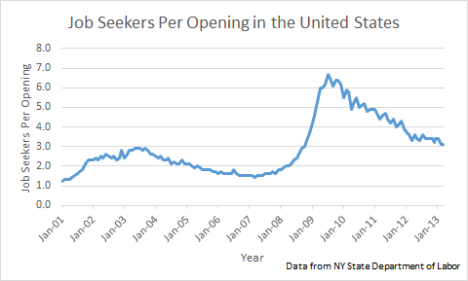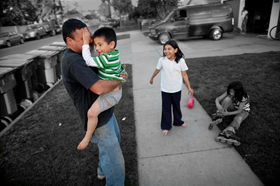This week there’s been a lot of news around the Supreme Court and the Senate passing immigration reform. Poverty has been around for longer than newspapers, so it’s not exactly a breaking news scoop. That’s part of why poverty is under-covered in the news, and why we make sure to cover the stories that do highlight poverty as an ongoing issue that we all need to be concerned about. To paraphrase Karl Barth, one should preach with a Bible in one hand, and a newspaper in the other. To make that easier, we’re continuing to bring you the top stories in poverty for the week, and we’ve added some brief commentary based on the Revised Common Lectionary for each week. As always, leave a comment if you think we missed a big story.
The Newspaper:
1. Too many children still live in poverty, but improvements have been made in health and education, according to a new report from the Annie E. Casey Foundation.
“From roughly 2005 to 2011, the teen birth rate dropped by 15 percent to a historic low. The rate of high school students not graduating in four years saw an almost 20 percent decline, as did the child and teen death rate. The percentage of children without health insurance decreased by 30 percent.”
2. The safety net prevented children from falling into poverty during the recession by expanding during the economic downturn.
“So let’s get this straight: the poor and their advocates were not the ones who tanked the economy. Nor should they be on the defensive when the safety net expands to offset some of the damage. The right question at such times is thus not why the SNAP rolls are so high. It’s whether SNAP, unemployment insurance, T.A.N.F. et al are expanding adequately to meet the needs of the poor.”
3. The Bozeman Daily Chronicle ran a two day story on poverty in Bozeman, Montana. In addition to being interesting, it’s also a great example to share with your local paper to encourage them to highlight poverty in your community.
“‘I do piecework to keep my family going, pay my rent,’ said Sara, a 40-year-old, single Bozeman mother of three.
Her hands were always busy, folding locally manufactured eyeglass retainers into plastic packages, to sell in stores to people who have more disposable income than she has.
Earning 7 to 20 cents per piece, Sara is typical of Bozeman people living in poverty. She works, but doesn’t earn enough to make ends meet. She and her kids get help in the form of food stamps, subsidized housing, Medicaid and subsidized school lunches.”
4. In a world requiring increasing financial sophistication, it’s important that there is some degree of financial literacy to prevent the poor from being swindled by payday lending and other financial arrangements.
“Finances are taught at home, and for low-income families, this isn’t a priority. People are just thinking about getting by month to month. It becomes a matter of “Do I pay the gas or groceries this week?” They’re not thinking about “What’s the interest on my credit card?” or “Should I be saving at a different bank?””
5. Bernadine Watson tells her story of climbing out of poverty, and doubts that it would be possible today.
“These days, when I open the newspaper or turn on the news, I see my past. The policy debates currently raging in this country — about welfare and food stamps, affirmative action and students loans, take me back to a time when I was dependent on social programs to pull myself out of poverty. Given our current policy environment, I doubt that I’d be able to accomplish that today.”
The Bible:
The Gospel this week (Luke 9:51-62) is terrifying, showing the radical commitment required to be a disciple. It’s not a commitment we are allowed to procrastinate on. It will not wait until our parents have passed on or we have said all of our farewells, it is an urgent call to drop everything and follow Jesus. This discipleship is not easy, as Jesus reminds us “”Foxes have holes, and birds of the air have nests; but the Son of Man has nowhere to lay his head.” This is a statement of both spiritual and physical homelessness. As an itinerant minister Jesus was poor and homeless, in need of the support of the community.
We also hear in Galatians 5:14 “For the whole law is summed up in a single commandment, “You shall love your neighbor as yourself.” Love means taking action to comfort ones neighbor in times of trouble. As Cornel West memorably put it, “Justice is what love looks like in public.”
Filed under: Uncategorized | Leave a comment »




